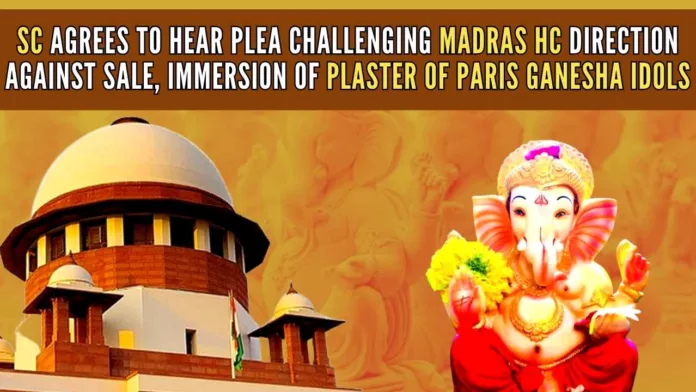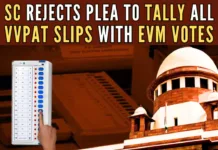
In special Sunday sitting, Madras HC stayed single judge order allowing sale of Ganesh idols containing Plaster of Paris
On Monday, the Supreme Court agreed to hear a plea filed against an order of the Madras High Court directing the Tamil Nadu authorities to take action against any manufacture, sale, or immersion of Ganesha idols made of Plaster of Paris or plastics.
“We will take it up on the end of the board today,” said a bench headed by CJI D Y Chandrachud acceding to the urgent mentioning request made by senior advocate Shyam Divan, appearing on behalf of petitioner artisans.
In a special Sunday sitting convened on September 17, a division bench of Justices S S Sundar and Justice Bharatha Chakravarthy of the High Court stayed the directions passed earlier by a single judge bench holding that the sale of idols made of Plaster of Paris cannot be restricted but their immersion in water bodies can be restricted.
A single bench of Justice G R Swaminathan of Madurai bench had said that the 2020 Revised Guidelines for Idol Immersion issued by the Central Pollution Control Board will only prohibit immersion of idols made using Plaster of Paris and will not prohibit artisans from manufacturing or selling these idols.
It had directed sellers to maintain a register containing particulars or details of the purchasers adding that if the Vinayaka idol can be dissolved in an eco-friendly manner, its installation cannot be stopped.
“The petitioner as an artisan is entitled to sell the articles made by him and this right is guaranteed under Article 19(1)(g) of the Constitution of India. The restraint on immersion is a reasonable restriction. But prevention of sale would amount to a violation of the petitioner’s fundamental right,” had held the High Court on September 16 while allowing the writ petition.
[With Inputs from IANS]
For all the latest updates, download PGurus App.
- BJP drops 2-term sitting MP Poonam Mahajan; fields 26/11 counsel Ujjwal Nikam from Mumbai North Central - April 27, 2024
- RBI sets criteria for Small Finance Banks seeking Universal Banks license - April 27, 2024
- 16 Indian crew members on seized cargo ship to be released soon: Iran Foreign Minister - April 27, 2024










